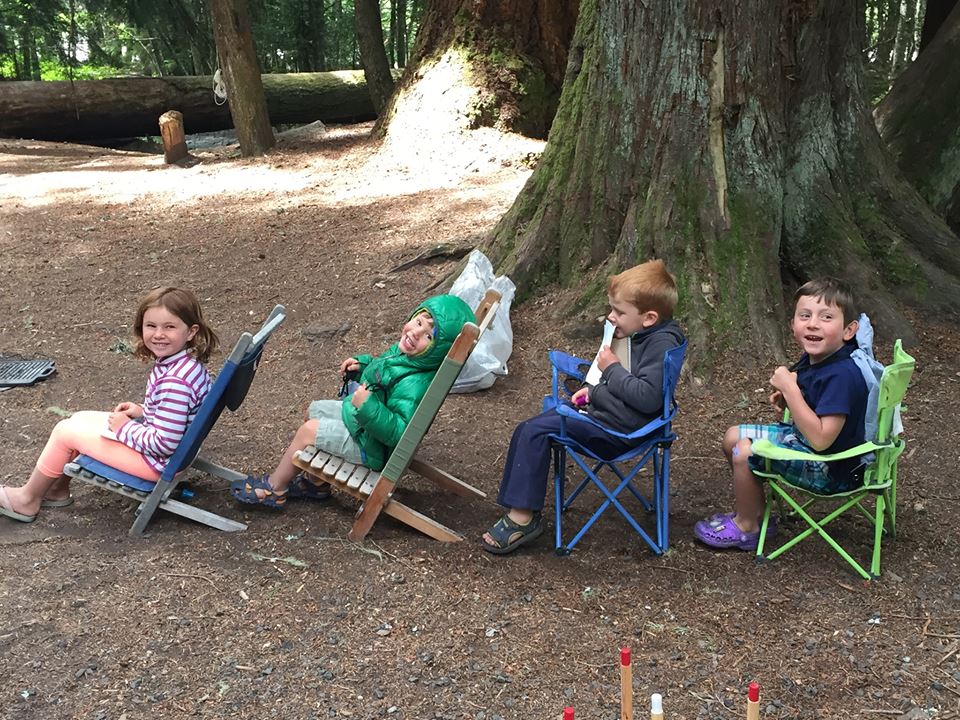Portrait of a Bilingual Marriage
/I live in a schizophrenic household. Two languages, two cultures, two sets of swear words. In our marriage of 40 years, my French husband and I have lived daily between two worlds. We lived in his country, and in mine. We worked in his country, and in mine. We raised two children in his language, and in mine. We read, think, act and eat in his culture, and in mine. We stay abreast of politics here and there. Sometimes we forget words in our native tongues only to remember that phrase in each other's language. I say "his" and "mine" but in our reality, honed now in these over 40 years, our two worlds are inextricably intertwined, French and American, heart and soul, day-in-and-day-out.
Our identities weave in and out with the languages of the movies we watch; of the newspapers, magazines, books, and websites we read; with the meals we prepare. Subtitled movies are distracting because we notice the bad or erroneous translations, and even spelling errors. We joke in two different languages, and on occasion we accidentally concoct some witty cross-language puns. I even feel different at times depending on if I speak English or French—a certain "je ne sais quoi." Maybe a tad more Yankee with my hard American chime, or a tad more continental with my acquired French tenor. I am split.
Creating a Legacy
Perhaps our most enduring legacy of our bilingual voyage is having raised our children to be fluent in French and English. I am a fervent and vehement advocate for learning languages from the womb on. Yes, it is possible, and yes, it is only a good thing. I was determined that my kids grow up bilingually from day one, and not learn a new language at the late age of 20, like I did. Both my children were born in France, and by the time my first-born came along, I had been living in my adopted country for four years. For all that time I spoke only French on a daily basis, to the point that my English was getting rusty. I made spelling errors in English and I had a hard time finding the English words when speaking to my parents on the phone. As soon as my first-born arrived, I resolved to only speak English to him. Period. It was good for him, and good for me to get the rust out! This precedence had to be set immediately. My husband and I only spoke French with each other from the get-go (so I could learn it), and we were determined that I only speak English with our children, since they would only be speaking French with their father and everyone else around them. I would be their only source of English.
Our language relationships did not change when we came to the United States. French is still the dominant language in our home. As our children were growing up, both French- and English-speaking dinner guests in our home were treated to a scene of babelsque chatter, a sort of language ping-pong, as the mother tongue would switch back and forth depending on who was addressing whom. Our children are grown and living their lives now, but our language ping-pong continues with dinner guests.
Forked Tongues
It is our eating in two different languages and cultures, though, that has been my husband's and mine most daily challenge over the years, and the seed of many an argument. Being French, of course, my husband is a foodie and intimate connoisseur of all things gourmet simply by his birthright. It's in their genes; they are brought up that way from infancy. I willingly embraced it, and learned to cook many of their delectable dishes. However, the French dictate and obsession with the daily baguette for every meal has always been a thorn in my side. At first I loved the bread, and for many years gobbled it down. And while I still appreciate a nice, fresh, country confected loaf or baguette, I don't appreciate the constraint of assuring that it is always on the table, day-in and day-out. For a French person, bread on the table is an integral part of a table setting, part of the scene, along with salt and pepper, napkins, plates, and silverware! While I have absorbed many things French into my DNA, for some reason, this gene has not grafted well within my system. I can eat a meal without bread! My husband cannot and thus, our eternal bone of contention for the past 40 years. I simply don't always think of buying it for daily consumption, and he neglects to make the side trip to pick it up.
This simple irritation sometimes leads to a greater argument and then, beware of forked tongues! My husband knows when I am really, sincerely angry because I revert to English, and quickly, English swear words in a whiplash flash. French swear words just don't have the same impact to me. They don't sound as mean with that softened cottony French tonal edge.
Opening Windows to the World
Language is a bedrock of who we are. We identify with a culture through it, and we expose our personalities through it. It's how we learn and communicate. While most of us don't have the chance to start out in life with two languages, we don't have a choice of the one we are born into. We can choose to learn another one, or several. It opens windows to the world, bringing awareness of other worlds. Kids are sponges, and their brains are constantly growing, evolving, thinking. It's easy for them to learn another language, and the earlier, the better, before they have pre-conceived ideas about how things should sound, be pronounced, or that there is only one word for something. Not only does learning other languages give them amazing communication tools, but it piques their curiosity about other cultures, geography, and history. Recent studies even say that bilingual children have more avidly developed brains, somewhat akin to being able to do two things at once.
Learning a language shouldn't begin in a classroom. That should come later. Much later. How did we learn our language as children? Not with books, not with vocabulary lists or weekly quizzes. Just by hearing, watching, repeating. The reading, writing, and spelling came later. There are a lot of programs today such as Rosetta Stone and others that try to teach in this vein of just listening, and granted, as an adult it is hard to surrender to "just listen." Our learned ways tell us to take notes and scribble in the margins of a book. Lingohop, a new app to be widely available soon, strikes me as a better and more intuitive experience for today's language learners on the go.
Many couples and families in the United States are bilingual today, and yes, many are immigrants. Yes, one should learn the language of the country one has adopted, but not to the detriment one's original language just to "blend in." Depriving one's child the gift of two languages is shortsighted and selfish. It takes some discipline to maintain both languages in the home, and there may be an inevitable refusal by the children at some point to speak the second language because "none of their friends do." But how criminal to miss that childhood opportunity when it so easy for them to learn without any effort.
Our Next Generation
My husband and I are proud that our children are now raising their children in bilingual households. Our efforts haven't fallen on deaf ears and today I smile, satisfied that my young grandchildren's French is better than mine and their English is better than their French grandpa's. They even correct us. Intuitively, they just know how it should be spoken. I hope they will aspire to be citizens of the world. They already have some good tools for starters. Oh, and I wish them schizophrenic lives as well.




